Homeowner's Handbook to Different Types of Fences
A great fence can amp up a home’s value and so much more. With the benefits of privacy, security, and aesthetic appeal, having the perfect fence for a home is important, but finding the right one can be a little complicated. To make things easier, we’ve prepared this complete guide to home fence types. Follow along to navigate the different types of fences and get tips on keeping yours in tip-top shape.
Popular Fence Types
Explore the best residential fencing options and the best fence styles for homes.
Wood Fences
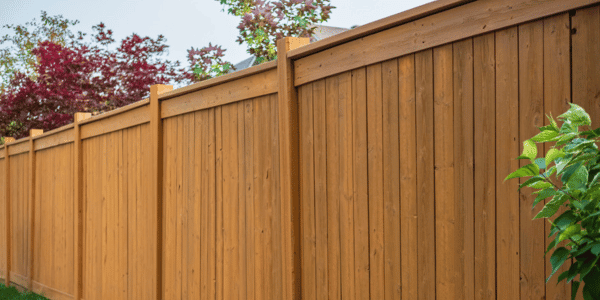
Commonly made of white oak, redwood, cedar, or pine, wood fencing offers a classic vibe and is a go-to for many homeowners. When it comes to different styles of fences, wood fences are visually pleasing, practical, and affordable.
Best for: Adding warmth to an exterior, while still providing privacy.
How to maintain wood fences: Use a mild detergent and water to clean dirt and mildew or a power washer for tougher stains. Every two to three years, apply a sealant to protect against moisture and UV damage. If you do see damage, loose boards, or rot, replace the sections promptly to prevent widespread deterioration.
Wood Fence Pros
- Classic aesthetic
- Private
- Customizable
- Easy to repair
Wood Fence Cons
- Consistent maintenance needed
- Needs to be stained, especially for non-rot-resistant options
- Prone to damage
- Shorter lifespan
Vinyl Fences
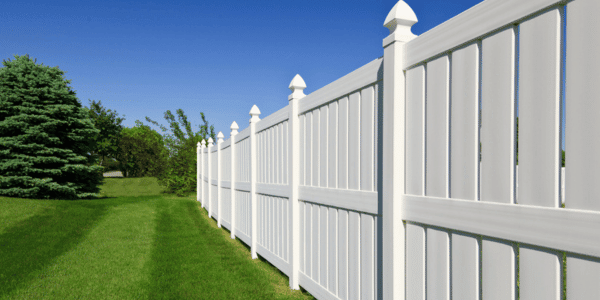
Vinyl fences are a synthetic type of fence made of plastic, vinyl, or PVC. They’re low-maintenance, weather-resistant, and strong, delivering a crisp wooden appearance without degradable materials.
Best for: Homeowners seeking a long-lasting, low-effort fencing solution for a great price.
How to maintain vinyl fences: Maintenance is as simple as hosing down the fence and using a soft cloth, as harsh chemicals and rags can damage the finish. You should check for cracks or breaks periodically, especially after severe weather. Extreme cold should also be monitored, as the vinyl can become brittle in such conditions. A vinyl patch kit can get most repair jobs done, with replacements only necessary for major damage.
Vinyl Fence Pros
- Can’t be damaged by insects
- No splinting or rotting
- Many styles
- Easy to install
Vinyl Fence Cons
- Needs consistent cleaning
- Can be expensive
- Limited colors
- Susceptible to extreme cold
New fencing can make a lawn pop! Follow our lawn care tips to keep things outside your front door fresh and fabulous!
Composite Fences
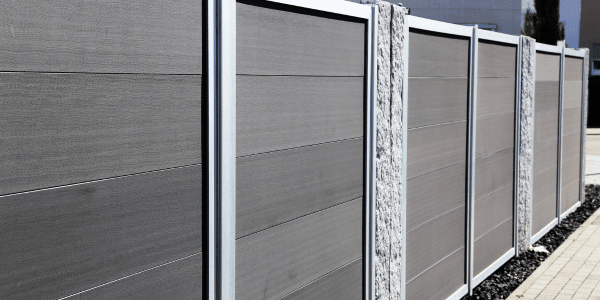
Composite fencing is crafted from wood fibers and recycled plastic. A type of yard fence that's perfect for eco-conscious homeowners, you’ll get the look of a wood fence without the hefty maintenance requirements.
Best for: People who want a strong, environmentally friendly fence with minimal upkeep.
How to maintain composite fences: Gently scrub with a composite fence cleaner that’s made specifically for its makeup twice a year. Address cracks, popped nails, and bowing ASAP and routinely apply a UV-protectant to preserve the fence’s color.
Composite Fence Pros
- Long-lasting and durable
- Easy to install
- Traditional aesthetic
- Won’t warp or rot
Composite Fence Cons
- More expensive than wood and vinyl fencing
- Needs specific maintenance materials
- Susceptible to expansion and contraction
- Fades over time
Wrought Iron Fences
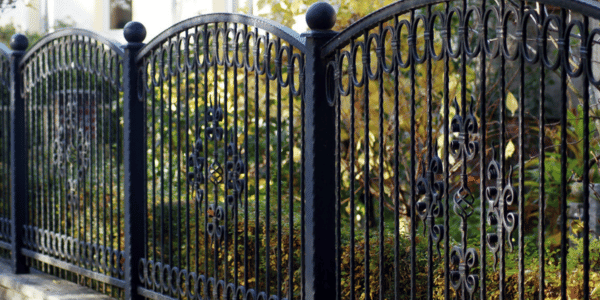
The longest-lasting material, wrought iron fencing is also often the most expensive fence type, but that cost comes with extreme durability and a regal appearance.
Best for: Historical homes and high-end properties.
How to maintain wrought iron fences: Apply rust-inhibiting primer or paint to the fence to avoid problems from the get-go, and regularly check for rust spots that may need sanding or painting.
Wrought Iron Fence Pros
- Good security
- Classic and elegant design
- Low maintenance
- Increases property values
Wrought Iron Fence Cons
- Can rust
- Expensive
- Limited privacy
- Difficult to install
Make sure you’re giving your deck some TLC, too. Check out our deck maintenance tips for beginners.
Chain-Link Fencing
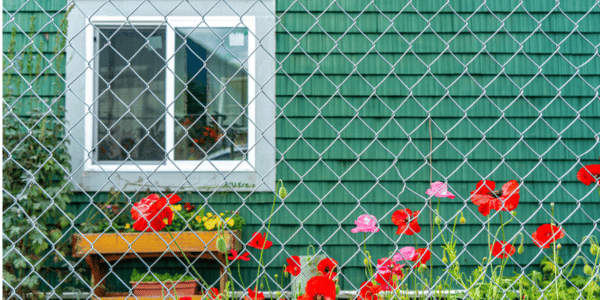
Chain-link fencing is constructed from steel wire bent in a zig-zag pattern. It was once a popular type of fence, but has lost some appeal over time and has become a top choice for industrial and commercial properties instead of homes.
Best for: Homeowners looking to spend less money, let sunlight in, and keep an eye on their kids or pets.
How to maintain chain-link fences: The most important upkeep is maintaining the fence’s tension. Loose sections should be tightened, and any broken links or fittings should be repaired or reattached as soon as possible. To keep things clean, use a wire brush and water to remove rust and dirt.
Chain-Link Fence Pros
- Affordable
- Durable
- Low maintenance
- Adds security
Chain-Link Fence Cons
- Can be perceived as unattractive
- No privacy
- Can rust
- Limited designs
Beyond Different Types of Fence Designs: More Ways to Spruce Up Your Outdoor Space
You should carefully weigh your options for the different types of fences for yards. Whether you choose wood fencing, composite fencing, vinyl fencing, wrought iron fencing, or chain link fencing, you can enhance the beauty, security, and value of your property with an informed selection. Also significantly affected by your fence choice is the look and feel of your home’s backyard. For ideas on how to spruce up the space without the heavy cost of fencing, check out “5 Ways to Spruce Up Your Backyard on a Budget!”
Fence Type FAQs
How many types of home fences are there?
Fences come in a variety of materials, each with its own benefits, including:
- Wood fencing
- Vinyl fencing
- Composite fencing
- Wrought iron fencing
- Chain link fencing
- Picket fencing
- Split rail fencing
How much do fences cost?
Fencing costs vary depending on the type of material being used and how much is needed to complete construction, as do maintenance costs. In total, installation fees can range anywhere from $1,000 to $10,000.
What's the most affordable fence?
Chain link fences are usually the most affordable fence type.
Do I need a permit to build a fence?
It depends. For example, some cities only require permits for fences over 8 feet tall, while others require permits for fences over 3 feet tall. Check with your city for more details.
Which fence lasts the longest?
Metal fences are the longest-lasting fence type.
How long do wood fences last?
A properly maintained wood fence should last 15 to 20 years without major work.
What are chain link fences made of?
Chain link fences are typically made of steel wire that's woven together to create a mesh.